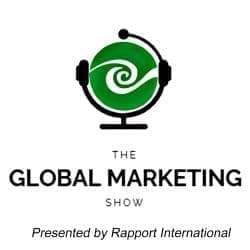Multinational Diagnostics – Show #128
- Multinational Diagnostics - Show #128 globalmarketingshow 31:07
Steve Becker is committed to improving human health by unlocking the power of molecular diagnostics. In the world of medical devices and diagnostics, you might think the latter falls under the purview of the former, says Steve, yet: “from a regulatory standpoint, diagnostics is covered by a lot of the medical device rules.”
Unlike medical devices like implants, however, “diagnostics is really the ability to measure your body, whether you’re healthy or sick; and if you are sick, what’s making you sick. Helping to uncover your health status and what you can do to improve is really the heart of diagnostics.”
In this episode, Steve shares the lasting lessons learned during his stints at Thermo Fisher, Quest Diagnostics, Agilent, and GE Healthcare, where he directed sales, global marketing, business development, and licensing. Learn how to navigate within a constantly changing healthcare business landscape, from the first steps toward launch to the regulatory requirements and cultural differences that can affect development, distribution, and product adoption.
Going to market on one’s own is a big task, says Steve – find the right partners to mitigate the commercial regulatory tasks and technical risks. Ultimately, the company whose name is on the product assumes the liability – “they’re the ones on the hook” – but relying on specialists along the way improves your chances of a streamlined launch.
During his tenure at Quest Diagnostics, the company built a “global diagnostics network,” pooling the capabilities, diagnostics insights, samples, testing and sharing of leading companies into one place. In the end, Quest brought the first Zika test to market, reliant upon colleagues.
In fact, choosing your initial target audiences can come into play even during development, as “diseases become more localized and companies are made for those markets,” Steve adds. Pay attention to “how to get paid for what you do,” your reimbursement strategy. In diagnostics, for example, ask yourself:
- Is it going to measure what we say it’s going to measure? (Analytic or clinical validity)
- Can we do anything with the information? (Utility)
Interestingly, reimbursement can often become political; for example, in the US it’s widely accepted that breast Cancer can come with a genetic indicator (the BRCA gene) – and the patient can take prophylactic steps or opt for watchful waiting. In contrast, Steve says that:
In a single-payer system, if you were 49 you could take the [BRCA] test; if 50, no test. The calculation includes risk, quality of life, total cost – someone makes a decision, snapped the line, and that’s where it landed.
Add to that differences stemming from culture and tradition, and it makes sense to work with local, in-country partners to navigate your go-to-market strategy, especially with regard to regulatory requirements.
To date, Steve says that European companies would often launch first domestically and then in the US because it was easier, but that’s starting to change as the EU changes its regulatory stance.
Regulations are stricter now in Europe, with liability going as far back as the manufacturer – for translation quality, for example. Diagnostic tests are now treated more like a medical device, including review by regulatory bodies, etc. – it’s a lot more work but it’s a good thing.
Think globally but act locally, Steve adds. You may use the same assay (investigative procedure for qualitatively or quantitatively measuring the presence, amount, or functional activity of an element) as in the US but a local company can handle the Technology, packaging, regulatory requirements, approvals, and clinical evidence and market under THEIR brand, with their own branding and local language. This happens consistently, across IV diagnostic companies – Abbott, Siemens, Roche, Thermo Fisher – and all of them have to treat each of their launches “locally,” working with in-country regulatory bodies to get approvals.
And vice versa: one of the first Covid tests distributed in the US was manufactured by a Korean company but marketed as a known American brand. In fact, working with companies around the world has interesting and complex effects on branding – “you’ll get a multi-national brand but lose some efficiencies,” according to Steve.
In the end, Steve’s advice is ever so simple: “You don’t want to take risks in the healthcare world.”
Links:
LinkedIn: https://www.linkedin.com/in/stevebecker/
Connect with Wendy – https://www.linkedin.com/in/wendypease/
Music: Fiddle-De-Dee by Shane Ivers – https://www.silvermansound.com


























